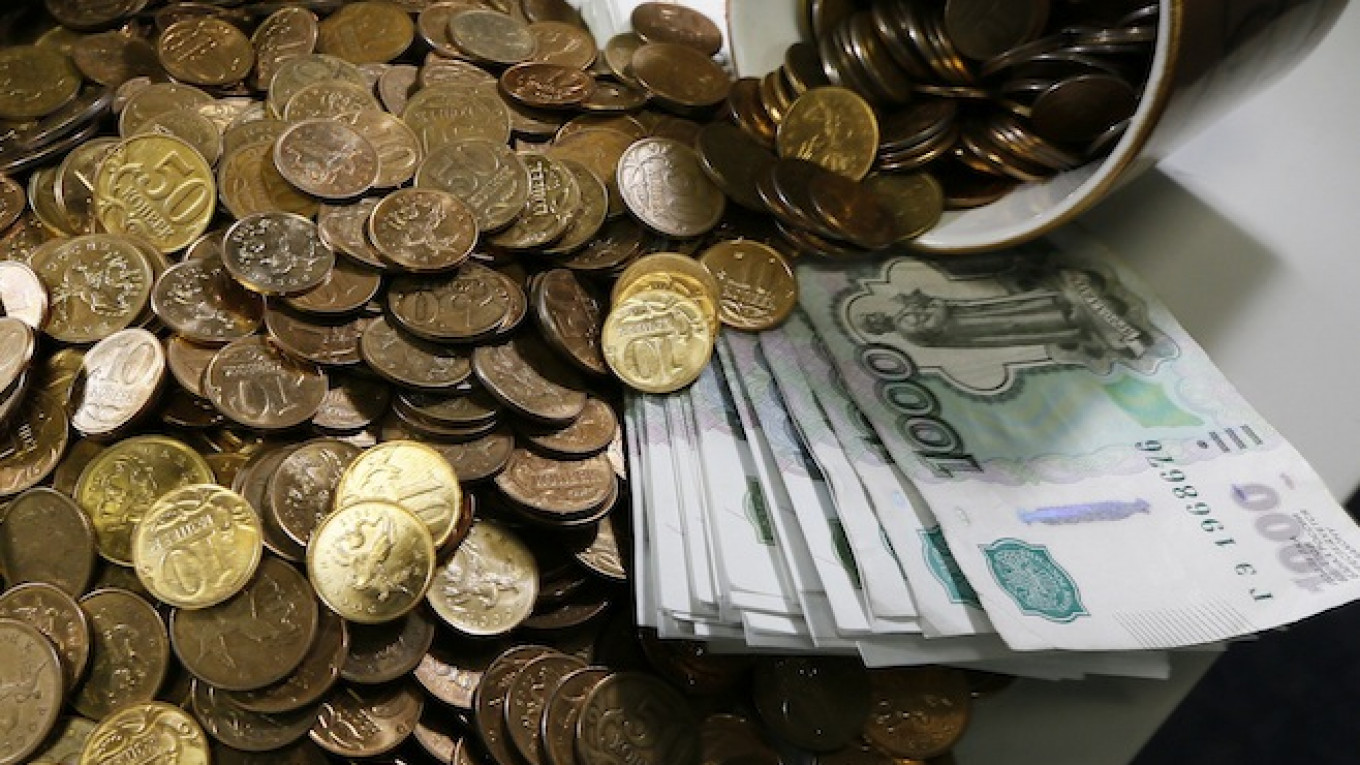PARIS — In recent weeks, the fall in the Russian ruble and Russian stock markets closely tracked the declines in global oil prices. But everything changed on Dec. 15. The oil price remained stable, but the ruble and the stock price indexes lost 30 percent in the subsequent 24 hours. An unprecedented effort by Russia's Central Bank in the wee hours of Dec. 16 to stabilize the ruble, by hiking the interest rate from 10.5 percent to 17 percent, proved useless.
The cause of Russia's "Black Monday" was readily apparent: the government bailout of state-owned Rosneft, the country's largest oil company. Usually, bailouts calm markets, but this one recalled early post-Soviet experiments, when the Central Bank issued direct loans to enterprises — invariably fueling higher inflation. The Central Bank's governor at the time, Viktor Gerashchenko, was once dubbed the world's worst central banker.
In 2014, the Central Bank is more constrained than it was in Gerashchenko's era: It cannot lend directly to firms. Yet it has also become more sophisticated at achieving the same ends that Gerashchenko sought.
In October, Rosneft issued $11 billion worth of ruble-denominated bonds (an unparalleled amount for the Russian market, equivalent to 70 percent of the total value of corporate bonds issued in Russia this year). The coupon on these bonds was actually 1.5 percentage points below sovereign bonds of similar maturity, which is also unusual, especially given that Rosneft currently is subject to Western sanctions.
Then, unnamed investors (allegedly the largest Russian state banks) benefited from the Central Bank's decision on Dec. 12 to allow these bonds to be used as collateral for three-year Central Bank ruble loans at the policy rate. Moreover, the Central Bank scheduled a special auction for such loans on Dec. 15 — with the total amount of the loans similar to that of Rosneft's bond issue. Thus the Central Bank would be able to provide a massive pile of rubles to Rosneft at below-market rates. So why did the deal trigger a panic?
At first glance, this deal was intended to meet contemporary Russia's most important economic challenge. Sanctions have cut off Russian banks and companies from Western financial markets. Russian companies have to repay or refinance about $300 billion of debt over the coming two years. Some of this debt is owed to Russian companies' offshore owners, who will certainly be happy to roll it over. But in most cases, firms' liabilities comprise real debt owed to major international banks.
The best example is Rosneft, which borrowed about $40 billion last year to buy its competitor, TNK-BP. About $10 billion of this debt has to be repaid in the fourth quarter of this year, including a $7 billion payment on Dec. 21 ($20 billion more will have to be repaid next year).
Financial market investors have been waiting patiently for the government to announce a strategy for addressing the issue of external corporate debt. The Central Bank did introduce a 12-month dollar facility for up to $50 billion, but this will barely last until the end of 2015.
Investors clearly wanted a bigger and bolder solution, given that the price of oil is likely to remain low, Asian financiers — even the Chinese — do not seem eager to refinance Russian companies, and sanctions are unlikely to be lifted. Rosneft had repeatedly asked for $40 billion from Russia's sovereign wealth fund. But with that money already committed to other purposes, the government opted for a non-transparent and non-market-based solution that would have made Gerashchenko proud.
Unfortunately, this solution poses several immediate problems. For starters, the risk of Rosneft defaulting — as well as the cost of providing subsidized loans — rests with the bondholders. If the bondholders are indeed the largest state-owned banks, the deal actually hurts the banking system: It increases the concentration of risk and implies additional losses from buying bonds with below-market interest rates.
Second, because Rosneft must repay its external debt, it is likely to use its bailout cash to buy dollars, which can only result in further downward pressure on the ruble. Rosneft has denied this publicly, but the markets nonetheless seem to expect that the newly printed rubles will flood the currency markets.
Third, the non-transparent structure of the deal undermines trust in the Central Bank's integrity and independence. The day after Black Monday, Economy Minister Alexei Ulyukayev said the Central Bank should have increased interest rates sooner. This immediately raised suspicion that the Central Bank delayed the interest-rate hike to complete the deal at the lower rate.
Finally, this bailout fails to answer the question it was supposed to address. Investors do not know whether the Rosneft bailout is a one-off deal and, if it is not, which companies can hope to receive similar treatment from the Central Bank. Thus they do not understand how (and whether) Russian corporate debt will be repaid or refinanced — or how much trust they can place in the ruble.
Sergei Guriev, a former rector of the New Economic School in Moscow, is a professor of economics at Sciences Po.
A Message from The Moscow Times:
Dear readers,
We are facing unprecedented challenges. Russia's Prosecutor General's Office has designated The Moscow Times as an "undesirable" organization, criminalizing our work and putting our staff at risk of prosecution. This follows our earlier unjust labeling as a "foreign agent."
These actions are direct attempts to silence independent journalism in Russia. The authorities claim our work "discredits the decisions of the Russian leadership." We see things differently: we strive to provide accurate, unbiased reporting on Russia.
We, the journalists of The Moscow Times, refuse to be silenced. But to continue our work, we need your help.
Your support, no matter how small, makes a world of difference. If you can, please support us monthly starting from just $2. It's quick to set up, and every contribution makes a significant impact.
By supporting The Moscow Times, you're defending open, independent journalism in the face of repression. Thank you for standing with us.
Remind me later.








